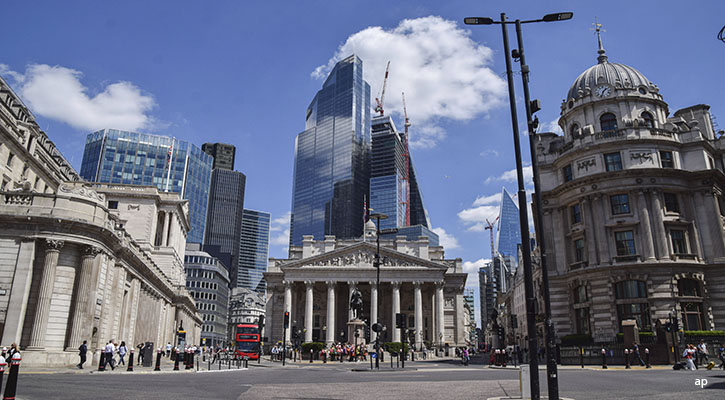
The Bank of England on Thursday lifted interest rates by 25 basis points again as it grapples against rampant inflation and the central bank markedly lifted its economic outlook for the UK, predicting a recession will be averted.
The quarter-point hike, which was expected, takes the benchmark bank rate to 4.50%, from 4.25%. It is the BoE's 12th successive rate hike. Bank rate stood at 0.10% prior to the current hiking cycle.
Seven policymakers voted for the hike, two voted against. The vote split was expected, with Silvana Tenreyro and Swati Dinghra backing a hold.
Ahead of the meeting, eyes were on whether the BoE would signal whether a pause in hikes was looming, or whether rate lifts would continue.
"The [monetary policy committee] will continue to monitor closely indications of persistent inflationary pressures, including the tightness of labour market conditions and the behaviour of wage growth and services price inflation. If there were to be evidence of more persistent pressures, then further tightening in monetary policy would be required," the BoE said.
While the journey to get inflation in the US back to target is approaching the final miles, prompting the Federal Reserve to choreograph a rate hike pause, things are for now markedly different in the UK.
Inflation in the US slowed to 4.9% in April from 5.0% in March, according to data released on Wednesday. In the UK in March, the annual rate of inflation was 10.1%. April figures are due on May 24.
"CPI inflation [averaged] 10.2% in 2023 Q1, higher than expected at the time of the February and March MPC meetings, with the upside surprise concentrated in core goods and food prices. Although still elevated, nominal private sector wage growth and services CPI inflation have been close to expectations," the BoE said.
"CPI inflation is expected to fall sharply from April, in part as large rises in the price level one year ago drop out of the annual comparison. In addition, the extension in the spring budget of the energy price guarantee and declines in wholesale energy prices will both lower the contribution from household energy bills to CPI inflation."
Food price inflation will ebb at a slower pace than expected, however. In its latest monetary policy report, the BoE predicted that inflation will return to target later than expected.
It predicts the UK's inflation will fade to 8.2% in the second quarter, 3.4% a year later and 1.1% 12 months after. The forecasts were raised from 8.5%, 1.0% and 0.8%, respectively.
However, the BoE also markedly lifted its gross domestic product outlook. It expects GDP to be flat in the second quarter of 2023, having previously pencilled in a 0.7% fall.
It forecasts 0.9% growth for the second quarter of 2024, markedly ahead of an earlier forecast of a 0.3% slip. It expects a GDP improvement of 0.7% for the second quarter of 2025, ahead of a previous outlook of a 0.2% rise.








.jpg)




















